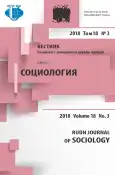LEARNING HOW TO WORK IN THE ARTS FIELD IN PORTUGAL: A BIOGRAPHICAL APPROACH TO THE MIGRANT ARTISTS’ TRAJECTORIES
- Авторлар: Ferro L1, Abrantes P2, Veloso L2, Teixeira Lopes J1
-
Мекемелер:
- University of Porto
- University Institute of Lisbon
- Шығарылым: Том 18, № 3 (2018)
- Беттер: 507-520
- Бөлім: Surveys, experiments, case studies
- URL: https://journal-vniispk.ru/2313-2272/article/view/340444
- DOI: https://doi.org/10.22363/2313-2272-2018-18-3-507-520
- ID: 340444
Дәйексөз келтіру
Толық мәтін
Аннотация
Авторлар туралы
L Ferro
University of Porto
Email: lferro@letras.up.pt
- Via Panorâmica, 4150-564 Porto, Portugal
P Abrantes
University Institute of Lisbon
Email: pedro.abrantes@iscte-iul.pt
- Avenida das Forças Armadas, Edifício ISCTE, 1649-026 Lisboa, Portugal
L Veloso
University Institute of Lisbon
Email: luisa.veloso@iscte-iul.pt
- Avenida das Forças Armadas, Edifício ISCTE, 1649-026 Lisboa, Portugal
J Teixeira Lopes
University of Porto
Email: jmteixeiralopes@gmail.com
- Via Panorâmica, 4150-564 Porto, Portugal
Әдебиет тізімі
- Aliagas C, Férnandez J.-A., Llonch P. Rapping in Catalan in class and the empowerment of the learner. Language, Culture and Curriculum. 2016; 9 (1): 73-92.
- Beck U., Beck-Gernsheim E. Individualization. London: Sage; 2002.
- Becker H. Art Worlds. Berkeley: University of California Press; 1982.
- Berger P., Luckmann T. The Social Construction of Reality. Garden City: Anchor Books; 1966.
- Bergsgard N., Vassenden A. Outsiders? A sociological study of Norwegian artists with minority background. International Journal of Cultural Policy. 2015; 21 (3): 309-325.
- Biesta G., Field J., Hodkinson P., Macleod F., Goodson I. Improving Learning Through the Lifecourse. London: Routledge; 2011.
- Borén T., Young C. The migration dynamics of the ‘creative class’: Evidence from a study of artists in Stockholm. Annals of the Association of American Geographers. 2013; 103 (1): 195-210.
- Bourdieu P. Distinction: A Social Critique of the Judgment of Taste. Harvard: HAP; 1984.
- Bourdieu P. The Rules of Art: Genesis and Structure of the Literary Field. Stanford: Stanford University Press; 1995.
- Caetano A. Personal reflexivity and biography: methodological challenges and strategies. International Journal of Social Research Methodology. 2015; 18 (2): 227-242.
- Canclini N. Hybrid Cultures: Strategies for Entering and Leaving Modernity. Minneapolis: University of Minnesota Press; 2005.
- Certeau M. L'Invention du Quotidien. Paris: Gallimard; 1990.
- Cordeiro G., Vidal F. A Rua: Espaço, Tempo, Sociabilidade [The Street: Space, Time, and Sociability]. Lisboa: Horizonte; 2008 (In Portug.).
- Darmon M. La Socialisation [Socialization]. Paris: Armand Colin; 2007 (In French).
- DiMaggio P., Fernández-Keller P. Art in the Lives of Immigrant Communities in the United States. New Brunswick: Rutgers; 2010.
- Dubar C. La Socialisation: Construction des identités sociales et professionnelles [Socialisation: Construction of Social and Professional Identities]. Paris: Armand Collin; 2000 (In French).
- Gruzinski S. La Pensée Métisse [The Mestizo Thought]. Paris: Fayard; 1999 (In French).
- Hackstaff K., Kupferberg F., Negronie C. Biography and Turning Points in Europe and America. Bristol: Policy Press; 2012.
- Hoerning E., Alheit P. Biographical socialization. Current Sociology. 1995; 43 (2): 101-114.
- Kiliç Z., Petzen J. The culture of multiculturalism and racialized art. German Politics and Society. 2013; 31 (2): 49-65.
- Kupferberg F. The established and the newcomers: what makes immigrant and women entrepreneurs so special? International Review of Sociology. 2003; 13 (1): 89-104.
- Lahire B. Portraits sociologiques: Dispositions et variations individuelles [Sociological Portraits: Dispositions and Individual Variations]. Paris: Nathan; 2002 (In French).
- Levinson B., Foley D., Holland D. The Cultural Production of the Educated Person: Critical Ethnographies of Schooling and Local Practice. New York: State University of the New York Press; 1996.
- Lundin R. et al. Managing and Working in Project Society: Institutional Challenges of Temporary Organizations. Cambridge: Cambridge University Press; 2015.
- Martinello M. Immigrants, ethnicized minorities and the arts: A relatively neglected research area. Ethnic and Racial Studies. 2015; 38 (8): 1229-1235.
- Nico M. et al. Licença para Criar: Imigrantes nas Artes em Portugal [License to Create: Immigrants in Arts in Portugal]. Lisboa: ACIDI; 2007 (In Portug.).
- Oliveira C., Gomes N. Monitorizar a Integração de Imigrantes em Portugal [Monitoring Immigrant Integration in Portugal]. Lisboa: ACM; 2014 (In Portug.).
- Peixoto J. How the global recession has impacted immigrant employment: the Portuguese case. Papademetriou D. et al. (Eds.) Migration and the Great Recession: The Transatlantic Experience. Washington: Migration Policy Institute; 2011. Pp. 106-125.
- Portes A., Guarnizo L., Haller W. Transnational entrepreneurs: An alternative form of immigrant economic adaptation. American Sociological Review. 2002; 67 (2): 278-298.
- Rácz J., Zétényi Z. Rock concerts in Hungary in the 1980s. International Sociology. 1994; 9 (1): 43-53.
- Scherger S., Savage M. Cultural transmission, educational attainment and social mobility. Sociological Review. 2010; 58 (2): 406-428.
- Soehl T., Waldinger R. Inheriting the homeland? Intergenerational transmission of cross-border ties in migrant families. American Journal of Sociology. 2012; 118 (3): 778-813.
Қосымша файлдар









